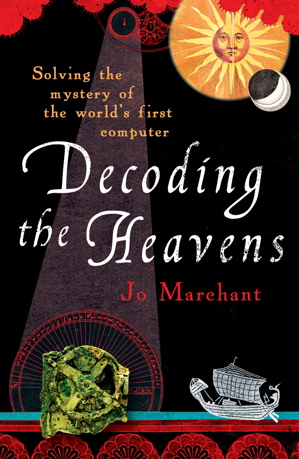
It seems that Decoding the Heavens is causing some controversy on the web. In recent weeks, some of the researchers working on the Antikythera mechanism, as well as Anne Bromley (second wife of the late Allan Bromley, another Antikythera researcher) have posted comments expressing concern about the way that certain parts of the book are presented.
As you'll know if you have read Decoding the Heavens, the Antikythera mechanism is an emotionally-charged area of research. All of the researchers involved have devoted years if not decades of their lives to solving its mysteries, and that has resulted in a fair amount of passion and rivalry. In fact without those driving forces they probably wouldn't have reached such impressive results. I for one am in awe of what they have each achieved, and in writing about their work, I'm proud to bring it to a wider audience.
But this also means that there are many disagreements between the various researchers regarding how different parts of the story unfolded, and where the credit for various different discoveries is due. I doubt that any single account could please everyone, but as a journalist I spoke at length to as many people as possible in order to reach my own careful and independent conclusions about what happened. In writing the book I've also tried to give a flavour of the various viewpoints, with different parts of the story seen through the eyes of different people, and it was important to me where possible to portray these scientists as human - reflecting their strengths and weaknesses rather than leaving them as bland, one-dimensional "heroes". I (and my publishers) stand by Decoding the Heavens as an honest and accurate account of the Antikythera story.
The majority of the researchers mentioned in the book are happy with the end result. But of course there are different perspectives and if you are interested in finding out about these then please do look at the comments from members of the Antikythera Mechanism Research Project (you can read them here). These researchers were very helpful and open when I first started reporting on the Antikythera mechanism, but I should note that after I told them in May 2007 that I planned to write a book, some members - Tony Freeth, Mike Edmunds, Yanis Bitsakis, Xenophon Moussas and John Seiradakis - declined to speak to me further (as noted in the acknowledgments of Decoding the Heavens). They said that to do so would conflict with their own plans for Antikythera books and media projects.
Tony Freeth was named to me as the AMRP team's spokesperson on any matters regarding Decoding the Heavens. I offered him the opportunity to comment on the two chapters regarding the team's work before publication but he declined, and in the nine months since the book came out, none of the team has mentioned any concerns about its content to either me or the publisher. I am sorry to hear at this stage that they believe there are inaccuracies, and any factual errors they raise now will of course be corrected in future reprints. I think though that most of the comments they have posted come down to differences in interpretation. For example, I refer to the AMRP group as Freeth's team, whereas they point out that Mike Edmunds was the academic leader of the team, who submitted papers and so on. This is technically correct (Edmunds held an academic position whereas Freeth originally did not), but none of the sources I spoke to were in any doubt that Freeth was the real driving force behind the project.
There are also several places where the AMRP researchers seem to have misunderstood my text. For example they attempt to correct my attribution on p. 101 of a treatise on the astrolabe to Geoffrey Chaucer, saying his authorship is not certain. In fact it is his authorship of a treatise on another astronomical instrument, the equatorium, that is in dispute (as discussed on the next page). His authorship of the astrolabe treatise is well accepted.
Finally, although some comments simply repeat points already made in the book, some do contain extra clarification or information. These are generally details that I chose not to burden the reader with. For example, the researchers note that when Hewlett Packard's Tom Malzbender and his colleagues (none of whom has raised any concerns about the book) flew to Athens "with their flashbulb dome packed in a crate", the dome was taken ahead by couriers rather than being on the same plane as the researchers. However these points may well be of interest to those wishing to dig deeper into events. I hope the team do go on to publish their own books as it will be great to have other versions of the story out there.
Regarding Anne Bromley's comments about the way her late husband is portrayed (you can read these here), it was not my intention to describe him in a negative way, and I am genuinely surprised by her reaction. The impression I got of Allan Bromley during my research was of a brilliant, lively, forceful, friendly person, who could be manipulative and competitive at times, especially when it came to knowledge and information, but who got things done and was capable of sweeping others along with his enthusiasm. I hope this is the way he comes across in the book, and multiple sources who were close to Bromley in both the UK and Australia have said that they found my account reasonable and fair.
It's good to see Decoding the Heavens provoking discussion though. Please do read the comments and make up your own minds.